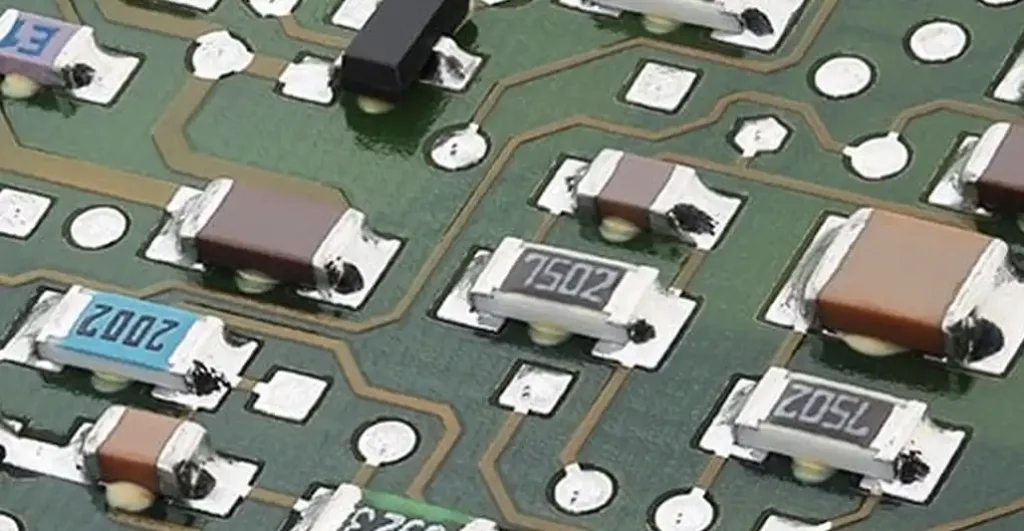Chip resistors, also known as surface mount resistors, are a key component in many of today’s electronic devices. They are small, reliable, and highly versatile, making them ideal for a variety of applications.
In this blog post, we’ll delve into what a chip resistor is, its types, benefits, and applications.
What is a Chip Resistor
A chip resistor is a compact, surface-mounted device (SMD) that limits the flow of electric current in a circuit. They are designed to be mounted directly onto a printed circuit board (PCB), a process that is typically automated due to the small size of the components.
Types of Chip Resistors

Thick Film Chip Resistors
These are the most common type of chip resistors. They are made by screen printing a thick layer of resistive material onto a ceramic substrate.
Thin Film Chip Resistors
Thin film resistors are made by depositing a thin layer of resistive material onto a ceramic substrate. These resistors offer higher precision and stability compared to thick film resistors.
Current Sensing Chip Resistors
These resistors are designed to measure the electrical current in a circuit. They offer low resistance values and can handle high current loads.
What Technology is Used in a Chip Resistor
The technology used in a chip resistor involves various materials and manufacturing processes. Here’s a brief overview:
Materials Used in a Chip Resistor
Chip resistors are made from a variety of materials. The choice of material depends on the desired electrical properties, cost, and the intended application of the resistor. The main resistor materials for chip resistors are:
- Silver (Ag): Silver is often used in the manufacture of chip resistors due to its excellent electrical conductivity.
- Palladium (Pd): Palladium is used in chip resistors for its stability and resistance to corrosion, which makes it ideal for use in harsh environments.
- Ruthenium Dioxide (RuO₂): Ruthenium dioxide is a ceramic material that is often used in thick film resistors for its good temperature coefficient of resistance (TCR) and stability.
- Copper Nickel (CuNi): This alloy is commonly used in chip resistors for its good resistance to corrosion and oxidation.
Manufacturing Process of a Chip Resistor
The manufacturing process of a chip resistor involves several steps:
- Substrate Preparation: The process begins with a ceramic substrate, which provides the mechanical support for the resistor.
- Deposition of Resistive Material: The resistive material (such as Ag, Pd, RuO₂, or CuNi) is then deposited onto the substrate. This can be done through various methods such as screen printing for thick film resistors or vacuum deposition for thin film resistors.
- Laser Trimming: Once the resistive material is deposited, it is often necessary to adjust the resistance value. This is done by laser trimming, where a laser is used to remove a small amount of resistive material, thereby increasing the resistance.
- Termination: After trimming, terminations are added to the ends of the resistor. These terminations allow the resistor to be soldered onto a printed circuit board (PCB).
- Protective Coating: Finally, a protective coating is applied to the resistor to protect it from environmental factors such as moisture and dust.
Benefits of Chip Resistors
Compact Size
One of the main advantages of chip resistors is their compact size. This allows for high-density mounting on PCBs, making them suitable for miniaturized electronic devices.
High Performance
Chip resistors offer excellent performance characteristics, including high precision, stability, and reliability.
Cost-Effective
The manufacturing process for chip resistors is highly automated, which makes them cost-effective to produce in large volumes.
Applications of Chip Resistors
chip resistors are an integral part of electronic circuits and are used in a myriad of applications due to their reliability, precision, and compact size.
Let’s explore some of the main applications of chip resistors:
- Consumer Electronics: Chip resistors are widely used in various consumer electronics such as smartphones, laptops, televisions, and gaming consoles. They help regulate power, reduce noise, and ensure the smooth operation of these devices.
- Automotive Systems: In the automotive industry, chip resistors are used in control systems, audio systems, and electronic components. They are crucial in the functioning of anti-lock braking systems, airbag controllers, and engine management systems.
- Medical Equipment: In medical devices like heart rate monitors, hearing aids, and medical imaging systems, chip resistors play a key role in ensuring accurate readings and reliable performance.
- Telecommunication Devices: Chip resistors are used in telecommunication devices such as routers, modems, and mobile base stations to ensure signal integrity and regulate power.
- Industrial Machinery: Industrial equipment like motor drives, power supplies, and automation systems also use chip resistors. They help in controlling motor speed, reducing electrical noise, and protecting the circuit from overcurrent or overvoltage conditions.
- Aerospace and Defense: In aerospace and defense applications, chip resistors are used in radar systems, communication equipment, and navigation systems. They are chosen for their reliability and ability to withstand harsh conditions.
- Power Supplies: Chip resistors are used in power supplies to help regulate voltage and ensure stable power delivery. They can also protect the circuit from potential damage caused by current or voltage surges.
Conclusion
Chip resistors play a crucial role in the electronics industry. Their compact size, high performance, and cost-effectiveness make them a popular choice for many applications. By understanding what a chip resistor is and how it works, we can better appreciate the complex electronics that power our everyday lives.